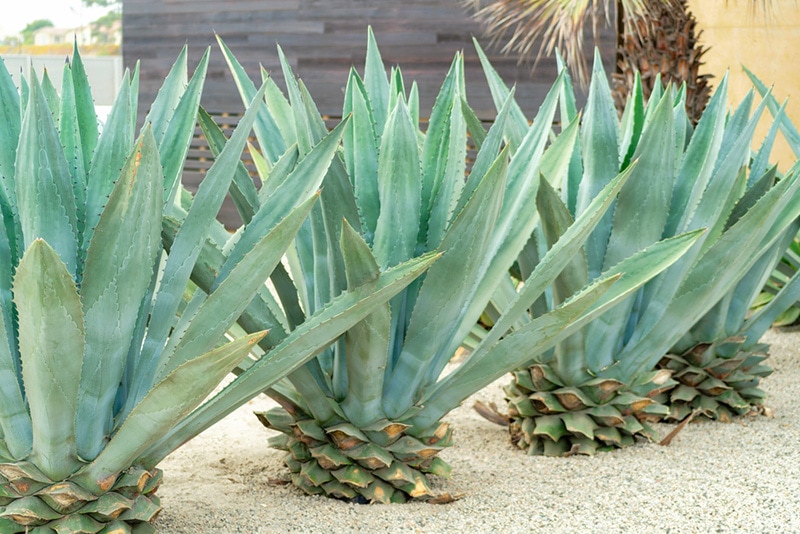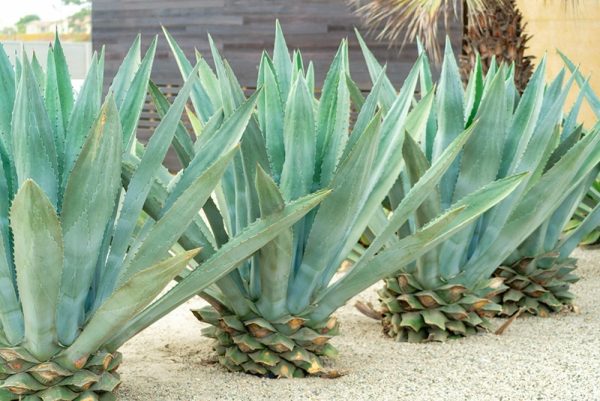Click to Skip Ahead
Agave nectar (or agave syrup) is a sweeter-than-sugar sweetener derived from the agave plant. Since honey is sometimes recommended for dogs, you might wonder if you can offer Fido a teaspoon or tablespoon of your agave syrup.
While agave syrup isn’t known to be toxic for dogs, it’s not a healthy or necessary addition to their diet. In addition, its plant counterpart is mildly toxic. Read on to learn more about agave and whether you should give it to your pup.

What Is Agave?
Agave is a type of monocot (grass-like flowering plant) native to the hot areas of the Americas and the Caribbean. It is a popular ornamental plant because it is easy to keep alive.
Agave nectar or syrup is a sweetener derived from the sap of agave plants, mainly Agave americana, Agave salmiana, and Agave tequilana. It’s often used as a sugar alternative in cooking and sometimes as a binding agent in foods like breakfast cereal.

Can Dogs Eat Agave Syrup?
The short answer is yes. Dogs can eat agave syrup. There are no toxic components in agave that could harm them. So, if you want to give your dog a lick of agave or use it as a sweetener in homemade dog treats, go for it!
Risks of Giving Agave to Your Dog
While agave syrup isn’t known to be toxic for dogs, it is not a healthy addition to their diet. Because it is primarily sugar, too much in one sitting can cause gastrointestinal upset complete with vomiting, diarrhea, and stomach pain. Too much too often can provide extra calories that can lead to weight gain and obesity, both of which have a slew of related health conditions like diabetes and joint disease. Agave syrup isn’t something your dog needs in their diet, and feeding it to them has no health benefits.
If you decide to give your pup a taste, moderation is key. Since it is sweeter than sugar, a little goes a long way.
PangoVet. It’s an online service where you can <b>talk to a vet online</b> and get the personalized advice you need for your pet — all at an affordable price!
</p>
<div class="su-button-center"><a href=https://www.dogster.com/dog-nutrition/"https://pangovet.com/?utm_source=dogster&utm_medium=article&utm_campaign=dog_eat_drink%22 class="su-button su-button-style-default" style="color:#FFFFFF;background-color:#FF6600;border-color:#cc5200;border-radius:9px;-moz-border-radius:9px;-webkit-border-radius:9px" target="_blank" rel="nofollow"><span style="color:#FFFFFF;padding:0px 24px;font-size:18px;line-height:36px;border-color:#ff944d;border-radius:9px;-moz-border-radius:9px;-webkit-border-radius:9px;text-shadow:none;-moz-text-shadow:none;-webkit-text-shadow:none"> Click to Speak With a Vet</span></a></div></div></div>"}" data-sheets-userformat="{"2":513,"3":{"1":0},"12":0}"> If you need to speak with a vet but can’t get to one, head over to PangoVet. It’s an online service where you can talk to a vet online and get the personalized advice you need for your pet — all at an affordable price!

Alternative Sweeteners for Dogs
Unlike cats, dogs can taste sweetness, so they might be drawn to sweet treats. Since agave is mostly sugar, are there any alternatives to give to your dog?
Yes, there are some alternative sweeteners you can give to your dog, but first, consider if sweeteners are necessary. Sure, your dog might enjoy lapping up the sweet syrup, but as we mentioned earlier, agave has no nutritional value for dogs.
- Coconut sugar
- Honey
- 100% maple syrup
- Monk fruit
- Artificial sweeteners (erythritol, Stevia, aspartame, saccharin, sucralose)
- A Note About Artificial Sweeteners: The sweeteners listed above are not toxic to dogs, but they may cause gastrointestinal issues. The long-term effects on pets have not been studied. If you choose to use them, it might be safer to stick with natural sweeteners.
Never give your dog xylitol or food products that contain xylitol. Be aware that xylitol sometimes goes by other names (wood sugar, birch sugar, and birch bark extract). It is toxic to dogs and can be fatal.
Frequently Asked Questions
My Dog Drank a Large Amount of Agave Syrup. What Should I Do?
Agave syrup is not toxic, but eating large amounts can still cause some gastrointestinal issues, like diarrhea and vomiting. However, to be on the safe side, contact your veterinarian. Tell them how much you think they consumed and when.

Can Dogs Eat Agave Plants?
Dogs should not be allowed to eat or interact with agave plants. Agave plants are mildly toxic if eaten by dogs. The sap can be irritating to the mucous membranes and gastrointestinal tract lining. If your pup has ingested the plant, they may experience gastrointestinal upset such as diarrhea and vomiting. They may also drool, lick their lips, swallow often, or lose their appetite. You can try flushing your pup’s mouth with cold water to provide relief from the sap irritation.
Additionally, some species of agave plants have needle-sharp spikes on their leaves. If your plant is one of these species, we recommend investigating your pup’s mouth if you suspect they have been gnawing on your agave. If there are any abrasions, call your veterinarian for advice.
Agave is an oxalate plant with sharp, tiny crystals in its leaves and stems. These crystals, known as calcium oxalate crystals, can cause swelling and pain if they touch your dog’s skin or mouth.

Final Thoughts
Agave syrup isn’t toxic, but it’s not a great source of nutrition for your dog, either. We don’t recommend giving your pup any. However, if you feel it necessary, offer a very small portion, as it is extremely sweet. Too much can cause tummy upset and potentially contribute to obesity.
See also:
Featured Image Credit: Wirestock Creators, Shutterstock











